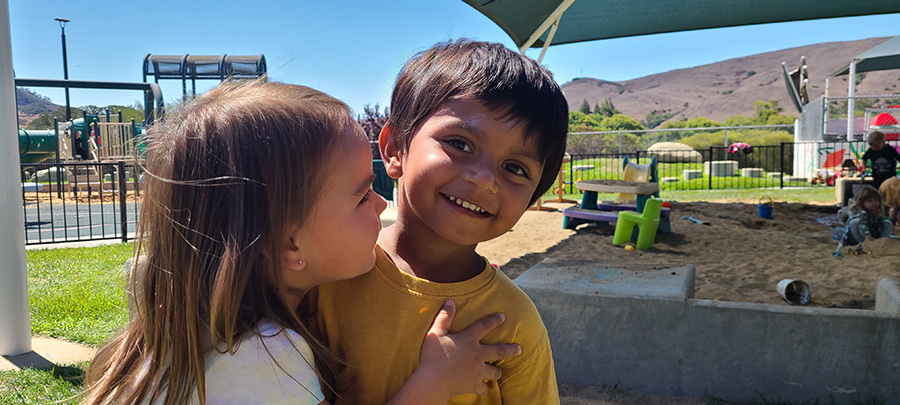Children's Center Philosophy

Play is the greatest avenue for learning in early education. The sense of wonder, discovery, curiosity, inventiveness and spontaneous energy of young children are sources from which a lifetime of learning should develop. The opportunity to participate in creative play is the highlight of the early years and our objective is to provide as many of these experiences as possible. All children, regardless of ability, ethnic background, race, religious beliefs, or family lifestyle are equal and are encouraged to participate in our non-discriminating environment.
Our teachers seek to create environments that inspire learning for children, parents, Child Development & Family Studies degree students, and for ourselves as we advance in our own professional growth as life long learners. We are a lab school that grows and changes as new research leads to new practice. We are proud to have been enhancing children’s lives for over thirty years.
We believe that low teacher-child ratios are the best way to support each individual child's growth and development. Our toddler classrooms maintain a ratio of 1 teacher to every 4 children. The middle classrooms maintain a ratio of1 teacher to every 6 to 7 children, depending on the number of children in diapers. The preschool classrooms maintain a ratio of 1 teacher to 8 children. These numbers do not include our lab students who are working with us while getting degrees in Child Development and Family Studies.
Our children’s programs follow the base philosophies of two nationally known early childhood organizations, the National Association for the Education of Young Children (NAEYC) and the California Department of Education & WestEd’s Program for Infant and Toddler Care (PITC). We have studied, and are strongly influenced by, the teaching and learning practices from the programs of Reggio Emilia, Italy, through the North American Reggio Emilia Alliance.
We are a demonstration site for the Outdoor Classroom Project. We are an active participant in Quality Counts San Luis Obispo and were rated as a Tier 5 program, the highest level possible. As of the 2022-2023 school year, we are pursuing accreditation through NAEYC and hope to complete that process by Fall of 2023.
We believe All children have the right to feel good about themselves and it is the responsibility of all teachers to nurture the child's self-esteem.
We believe That all our educational and guidance decisions for children must be based on our knowledge of child development, while promoting skills for self-help, problem solving, and negotiation.
We believe Each person is a unique individual and has his or her own needs. Each person has a right to meet this need in his or her own way and in his or her own time, while learning to be respectful the rights of others.
We believe Everyone is entitled to feelings, "positive" and "negative.” It is important for people to understand these rather than deny them.
We believe In appreciating and supporting the close ties between the child and family, children are best understood in the context of their unique family of origin and culture.
We believe Creativity and curiosity are self-expressions of individuality and should be encouraged.
We believe In helping children and adults achieve their full potential in the contexts of relationships that are based on trust, respect, and positive regard.
We believe Each child and family is due the respect for personal privacy demonstrated by professional ethics.
We believe All children learn best through authentic experiences that lead to competent social behaviors. All children must make mistakes in order to learn what is acceptable.
We believe That all children and adults in their lives deserve the opportunity to practice these principles at all levels of personal development.
We believe In modeling behavior that is culturally respectful of all family practices and beliefs.
- Creative Expression: art, carpentry, painting, music, movement, journaling, and dramatic expression
- Social Relationships: small and large group activities and dramatic play
- Communication skills: group time, reading aloud and sharing about the day, learning to negotiate difficult situations
- Math: Number recognition, readiness and conceptual skills: cooking, multi-material construction, block building, sorting, and matching activities
- Language and Literacy: Letter recognition, writing, reading, story-telling experiences, connecting vocabulary and written words
- Science: Discovery, exploration and environmental/science, awareness and care of animals, nature, bugs and plants, study of the natural world
- Motor Skills: movement, climbing, rhythm, dancing, constructing, drawing, painting, and manipulating many media materials in many ways
- Community Connections: Visiting the campus community and inviting visitors from the community to provide enriching educational experiences
